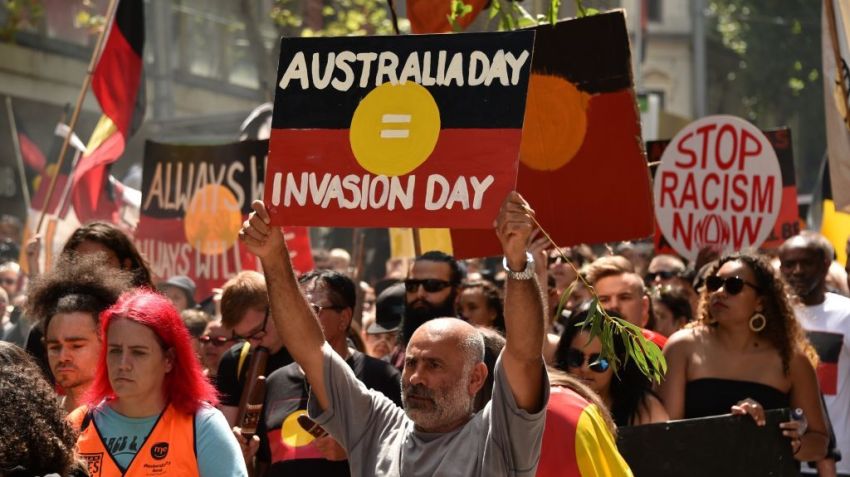
One hundred and fifty people marched in Sydney on Invasion Day in 2011, in the first of what has become a tradition of annual protests to mark the date. Since then, attendance at these marches has grown significantly, with up to 30,000 people taking to the streets of Sydney last year. Similar protests have also begun in other Australia cities.
Today, many people refuse to celebrate on January 26 — the day the colonial invasion and ongoing genocide of First Nations peoples began in 1788.
To start righting the wrongs of colonialism, we must start telling the truth about this history.
Solidarity
While there have been many important social movements in this country, few have sought to actively support the struggles of First Nations people.
Even when these movements have linked up with Aboriginal rights movements, they have rarely taken the next step of recognising Aboriginal sovereignty over this land.
For example, while there have been many campaigns to protect the environment, few have recognised that First Nations peoples have been here for almost 60,000 years protecting the land.
Many trade unions support Aboriginal rights, but few have actively involved themselves in campaigns to reclaim stolen wages or recognised the ongoing discrimination and inequality Aboriginal workers face.
If any date can serve to unify these different movements behind support for Aboriginal rights and sovereignty, it is Invasion Day.
Together with the usual demands, this year’s march will be an opportunity to raise the issue of Black deaths in custody, and in particular the ongoing campaigns for justice for TJ Hickey and David Dungay Jr.
TJ Hickey
This February 14 will mark 15 years since the tragic death of 14-year-old Aboriginal boy TJ Hickey who died in Waterloo, Sydney, after being impaled on a fence as a consequence of a police pursuit.
Every year since then, Hickey’s family and supporters — with his mother Gail at front — have marched to demand justice for TJ.
The refusal by successive state governments to put the police officers responsible for his death on trial is one more example of the endemic racism First Nations people have to endure.
A hastily-organised coronial inquiry in 2004 found that the death was an accident. However, the inquiry was full of irregularities.
The police officers present at the incident refused to give testimony while other witnesses were never called to give evidence. The bicycle that Hickey was riding at the time of his death went missing only to reappear after the inquiry had finished.
Demands to reopen the inquiry have been ignored and nothing has been done to ensure some kind of justice for TJ and closure for his family.
Last year, there was a slight shift in the state government’s attitude, when it offered to build a memorial for TJ on the site where he was killed. Although the government refused to install the plaque that the Hickey family wanted, a memorial now stands were TJ Hickey was killed.
Fifteen years on, the Hickey family continue to fight for justice for TJ. The campaign is currently seeking 11,000 signatures to demand a parliamentary inquiry into his death, while another protest to mark the date of his death will be held in Redfern on February 14.
David Dungay Jr
Twenty-six-year-old Aboriginal man David Dungay Jr died while in the hands of Correctional Services Officers (CSO) and Justice Health (JH) nurses on December 29, 2015. His death occurred just four weeks before he was due to be released.
Dungay’s death has been shrouded in mystery, with his family forced to spend the last three years fighting for any information and justice.
His death has highlighted the many inadequacies of the correctional, justice and health systems.
There were many clear breaches of policy and procedure littered throughout the case, including: the cleaning of the crime scene before any investigation; the alleged pressuring of JH nurses by CSO; and the restraint of Dungay in a prone position for more than double the legally permissible time (so as to administer a second dose of forced sedation).
Those responsible for his death have said the events leading up to Dungay’s death were due to inefficient training — a thoroughly inadequate defence for murder. Despite this, there is clear evidence that training has not improved in the years since, leading to fears that this could happen again at any moment.
A two-week coronial inquiry in Dungay’s death was held in July 2018.
Information released during the first week of the inquiry indicated that his death was avoidable. It is clear that had the officers and nurses present acted differently, Dungay would be alive today.
What is unclear is whether anyone will be held accountable for his death.
More than 400 Indigenous people have died while in police custody since the findings of the Royal Commission into Aboriginal Deaths in Custody were handed down in 1991. Yet not one police, prison or health officer has been found responsible for any of these deaths.
Dungay, like TJ and many before them, died in custody because they were Aboriginal.
This has to change and it has to change now.
[Raul Bassi is a Socialist Alliance member and is active with the Indigenous Social Justice Association (ISJA) and Fighting In Resistance Equally (FIRE).]